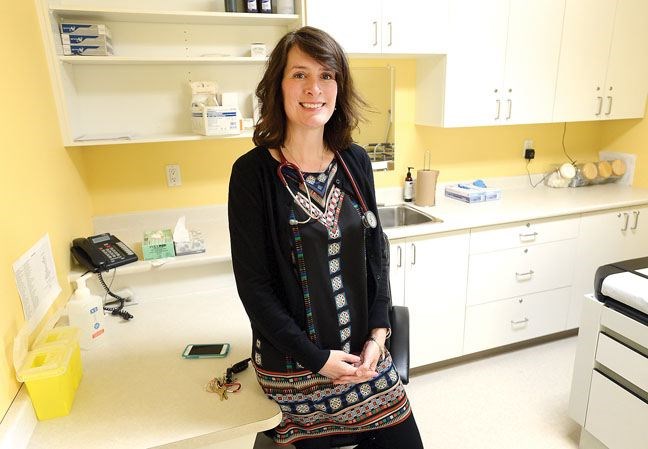Last week two new women's health clinics quietly opened in Prince George's downtown core.
Both New Hope Society and the Association Advocating for Women and Children will host once-a-week clinics aimed at marginalized women.
"There's a need for it," said Tracy Day, the nurse who will be seeing patients on Wednesdays and Thursdays. "Basically we're trying to get relationship building here at a place where women already feel safe and secure."
Day already works as a family nurse practitioner at the Central Interior Native Health Society, which is funding the program for at least a year, where she said they already do a great work serving the patients.
"But we offer aid there with the western medical model," she said, with regular business hours that require patients to make appointments. Northern Health also has a sexual testing clinic, offered once a week since October after it closed an underutilized five-day clinic.
That doesn't work for many of the women, some of whom are sex trade workers.
"The more marginalized the women the more barriers she faces to access health care services in a traditional way. So we wanted to provide a service to people that weren't accessing those services."
Marginalized women, sex trade workers and aboriginal women all face more barriers when accessing health care which ultimately leads to worse outcomes. This group already faces increased risk for sexually transmitted infections (STIs) and HIV.
The north has some of the province's highest rates for chlamydia and gonorrhea, according to the B.C. Centre for Disease Control.
A pilot project testing for such infections proved the women both wanted that community-based care and needed it, Day said.
"We got some really impressive numbers from that as far as number of tests and the number of positive tests," she said, adding she interviewed the women to see what kind of care was needed in the community.
"They all basically wanted to have full service clinics," said Day.
"So primary care clinics to offer things like medication refills or management of acute or chronic disease, whether they have sinus infections or a common cold or diabetes or HIV."
The pilot was part of Day's doctorate research looking at adaptive health care services for marginalized women.
"I feel very strongly about it. I'm very excited that it's finally starting," she said. "This is something that I've been working for about three years.
"The most important thing is being present and building the relationships," she said.
Having Day's presence has already helped at New Hope Society, said its executive director Jan Wilson. And, having a health care provider come into a space where trust already exists is huge.
"They feel safe because it's non judgemental. It's a confidential space," said Wilson. "They're way more open to talk about abuse, violence, sex assault, bad dates and get the health care they need for those things.
"Bottom line more women will get health care and feel comfortable doing it," Wilson said. "I am so happy that this clinic is here. I am ecstatic."
Offering a culturally sensitive approach to health care for indigenous patients is "extremely important," Day added.
"Many of the women that we see here have had really poor experiences because of lots of reasons - like historical trauma, political influences, societal influences. We have the residential schools and assimilation, the trauma that comes from that," she said.
As a government institution, the health care system can carry with it the weight of historical wrongs. Day pointed to the World Health Organization rankings for the Human Development Index. Canada ranks 6th in the world, while its First Nations rank 68.
"There's lots of factors that affect western medicine and why people will and won't access it."
The clinic at New Hope runs every Wednesday from 1:30 to 4:30 p.m. and at AWAC on Thursdays from 4:30 to 7:30 p.m.
New Hope is having a Valentine's-focused fundraiser at Shiraz Caf and Restaurant on Feb. 13, with a special menu, musician and a return trip to Victoria with Pacific Coastal airline as a door prize. Ticket's are $5.



